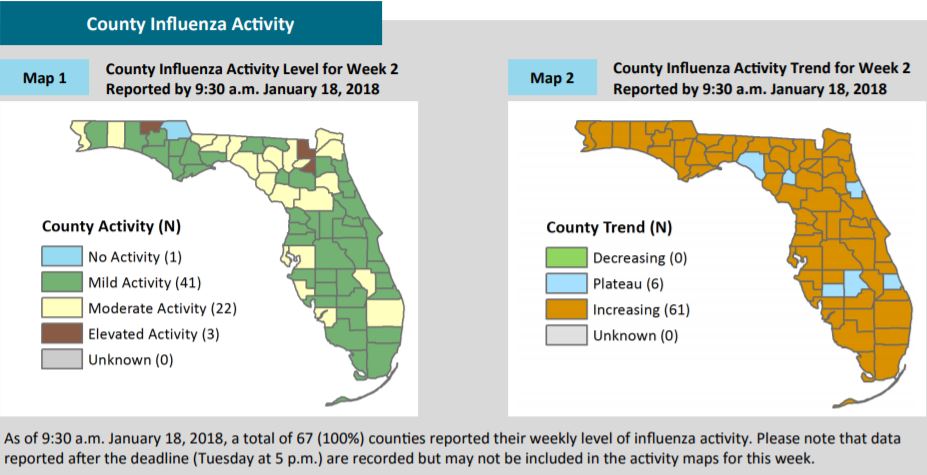(WFLA)-Following two relatively mild seasons, the flu virus is reaching epidemic proportions and peaking earlier than expected. But should you panic?
Let’s be clear, the flu is a dangerous virus affecting thousands of Americans each year that’s proven to be deadly. It should not be dismissed.
The Florida Department of Health has confirmed two Florida children, a 7-year-old and a 17-year-old both died from influenza-related complications. In both cases, neither child was vaccinated.
Earlier this week, we reported former News Channel 8 editor Joe Morrison died just 48 hours after he came down with influenza B. He was 58. Since his death, we’ve reported a number of influenza deaths across the country. But the Center for Disease Control and Prevention says the number of people dying from the flu this year is not unusually high compared to other years.
The CDC is calling the 2017-2018 flu season “moderately severe.” Nearly 6 percent of Americans visiting the doctor have flu-like symptoms.

In Florida, flu activity is increasing sharply in all regions of the state with 61 of its 67 counties reporting increased cases of the flu. In Pinellas County alone, more than five outbreaks of flu were reported this season.
The Florida Department of Health is reporting 107 outbreaks since the start of the 2017-18 season-that’s more outbreaks than in previous seasons at this time.
Although influenza-related illnesses are on the climb, the Florida Department of Health says deaths due to influenza have not increased at this time.
The CDC estimates 12,000 Americans die from flu-related deaths in a mild year. In a bad year, it kills up to 56,000 people. The majority of those deaths are among the elderly, but children, pregnant woman and middle-aged adults with heart or lung disease, diabetes, immune suppression or obesity are particularly at risk.
In addition to two pediatric deaths in Florida, 28 other flu-related pediatric deaths were reported nationwide this season. It’s too early to compare the numbers to the 110 children who died during the flu season last year.

According to the Florida Department of Health, nearly all of the outbreaks (94%) reported so far this season have been in facilities serving people at higher risk for complications due to influenza infection.The CDC says you may have the flu if you have some or all of these symptoms:
- Fever*
- Cough
- Sore throat
- Runny or stuffy nose
- Body aches
- Headache
- Chills
- Fatigue
- Sometimes diarrhea and vomiting
If you come down with the flu, the Florida Department of Health recommends you stay home for at least 24 hours until you’re fever-free and that you use good handwashing practices. The agency also recommends those who have not been vaccinated get vaccinated as soon as possible. “Though flu vaccines can vary in effectiveness from season to season, flu vaccines are safe and are the best way to prevent influenza infection and serious influenza,” the agency said.
If you’ve been hospitalized with the virus or if you’re severely ill and suspect influenza, the CDC recommends you use antiviral treatment as soon as possible. Treatment should be administered within 48 hours of illness onset, but treatment administered after this period can still be beneficial, the agency said.
For more information, visit: http://www.floridahealth.gov/diseases-and-conditions/influenza/_documents/2017-18/2018-w2-flu-review1.pdf







